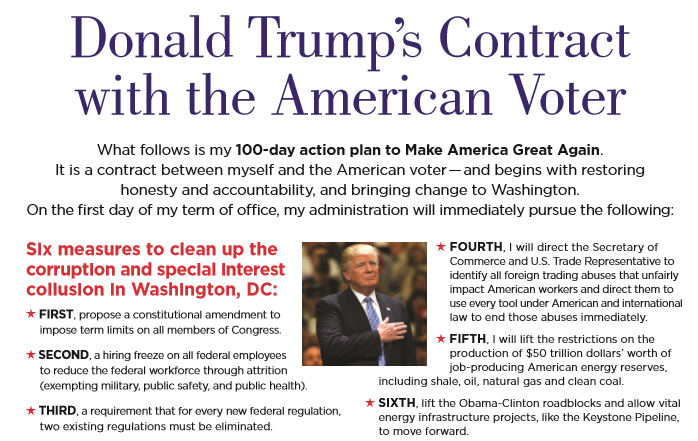Donald J. Trump made a lot of huge promises on the campaign trail, and in early November he published his “Contract with the American Voter,” which outlined his priorities for the first 100 days of his presidency. Now that he’s become President Trump, we’ll be looking at what he and his administration actually do with their first few months in power.
We’ve included his official contract here so that readers can compare what was promised with what is actually done in the first 100 days of this new Trump era.

The first five days
Donald J. Trump was officially sworn in as the 45th president of the United States and gave a dark speech about “American carnage.” Later, he promised to rid the face of the earth of “radical Islamic terrorism.” Pretty soon afterwards, he went about the business of signing his first bills before taking part in a fairly low-attended parade, and an evening of swanky celebratory balls.
Affordable Care Act:
While the country was distracted by the inaugural circus and related protests, Trump began making good on his commitment to end the Affordable Care Act by signing his first Executive Order aimed at “minimizing the economic burden” pending the full repeal of Obama’s key healthcare legislation. The action gives federal agencies the go-ahead to “waive, defer, grant exemption from, or delay” the enforcement of rules related to the ACA mandate.
National Day of Patriotism Proclamation:
There’s not much to say about this proclamation just yet since no specific date was set to observe all this awesome patriotism. Trump can proclaim a national day if he sees fit, as other presidents have done in the past, but it won’t be considered a federal holiday until it’s passed by Congress. Unless representatives have it in mind to repeal and replace Independence Day as well, it may not be the most pressing legislative priority.
Secretary of Defense General James Mattis:
Mattis (“Mad Dog”) was a favorite in the Senate, but was disqualified from the position due to a rule requiring former members of Armed Services to have been relieved of duty for at least seven years prior to accepting cabinet appointments. Trump signed Senate Bill 81, waiving that limitation, and the new Secretary of Defense was swiftly confirmed by a nearly unanimous vote.
Secretary of Homeland Security John F. Kelly:
President Trump also signed the paper trail leading to the confirmation of former Marine John F. Kelly as the secretary of Homeland Security. Kelly has a 45-year military career and lost a son in Afghanistan, but is a strong supporter of Guantanamo where he has commanded troops. Although many analysts and those that personally know him are unclear on his immigration policy stance, Kelly is the guy tasked with making Trump’s wall happen.
Keystone XL and Dakota Access pipelines:
With an executive action, Trump made a move Tuesday to advance government approval of both the Keystone XL and Dakota Access pipelines. In addition, he mandated that all materials used to build pipelines within the U.S. also be manufactured in the country.
‘Mexico City Policy’:
In accordance with his fairly recent pro-life beliefs, Trump reinstated a policy that cuts all U.S. funding to international non-government groups that perform, or even mention, abortion as a medical option. Obama had rescinded the policy that originated under Reagan, allowing for financial assistance unrelated to abortion services.
Trans Pacific Partnership (TPP):
In an executive memo signed on Monday, the new president pulled the U.S. out of negotiations for a trade deal with Japan, Australia, Vietnam, Canada and Mexico. The TPP was a hot topic of debate throughout the election.
Hiring Freeze:
Trump imposed a hiring freeze for non-military federal employees in his effort to reign in government spending. However, the freeze does apply to more than 2,000 positions the Department of Veterans Affairs was hoping to fill.
The new administration held their first official press conference on Saturday under Press Secretary Sean Spicer, and used the podium to affirm the president’s stance on ISIS and his commitment to wiping out “radical Islamic terrorism.” However, he spent the majority of his camera time capital berating the press for what Trump considers to be a misrepresentation of inauguration crowd size.
Trump spent Sunday planning out his moves for his first full week in the White House, but made time to call Israel Prime Minister Benjamin Netanyahu from the Situation Room.
Those are the highlights of the first days. Check back with us for frequent updates as new actions are taken by Trump and his administration.







